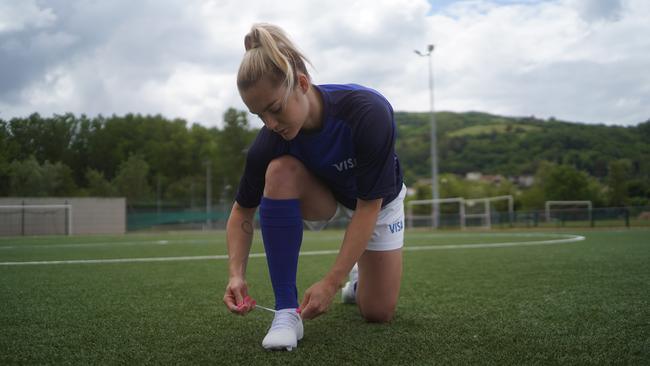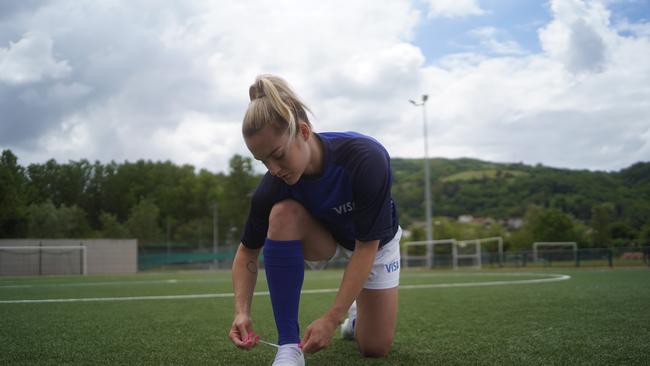Visa puts $500,000 behind women-owned small business for FIFA Women’s World Cup
As the FIFA Women’s World Cup rapidly approaches, the tournament’s global partner Visa’s marketing plans kick off. This year, it’s putting US $500,000 behind women-owned small businesses.

The FIFA Women’s World Cup is rapidly approaching, and marketing plans associated with the tournament have kicked off, as its global partner, Visa, announces its ‘Player of the Match’ initiative which both spotlights on-pitch player performance, and backs women-owned small businesses in the 32 qualifying countries represented.
Visa has put US $500,000 in funding behind the project, portions of which will be granted to small women-owned businesses located in the winning player’s country.
With less than a month to go before the first match, FIFA’s ticket sales in Australia have been strong to date, with 1.1 million sold for the 35 Australian-based matches, while 250,000 have been sold for the 29 matches taking place in New Zealand.
Since surpassing the total ticket sales for the France tournament in 2019, the 2023 event is set to be the most attended standalone women’s sport event in history, according to FIFA. The Visa ticket pre-sale in September last year outsold the 2019 Paris tournament pre-sale by four times.
At each of the 64 matches taking place between July 20 and August 20, Visa will award a top-performing player with its ‘Player of the Match’ prize, as voted by fans.
As far as partnerships go in the realms of marketing, Visa and the FIFA Women’s World Cup is a powerful one, and is underpinned by initiatives that span more than 15 years which the brand has rolled out to address gender equality. 2007 was the first Women’s World Cup the globally ubiquitous brand put its name to.
This year, Visa has enlisted 33 women football players as ‘Team Visa’ athletes. In Australia and New Zealand the players include Ellie Carpenter from the Matildas and Claudia Bunge from the Football Ferns, both of whom have also been part of the brand’s ‘Play On’ program, which concludes later this week and helps keep young women in sports (Australian girls drop out at twice the rate of boys, according to research).

Speaking exclusively to The Growth Agenda, Natalie Lockwood, Visa’s head of marketing for Australia, New Zealand and South Pacific said of ‘Player of the Match’: “That initiative really stems from our understanding that equity requires action and resources. And we‘ve certainly seen that when it comes to women in sport. That’s why we’ve supported females in sport for a long time and also in business.”
Ms Lockwood added: “Sport and football is a powerful platform for promoting gender equality, and not only for the athletes. It‘s also very empowering for women and girls who are watching and supporting the women who are on the pitch.”

The impact of the ‘Player of the Match’ initiative will also extend off the pitch, and aims to tackle another obstacle women-owned and led businesses face; lack of access to capital.
In Australia, recent research conducted by the Australian Small Business and Family Enterprise Ombudsman’s office found that 43 per cent of women owned businesses still find access to funds a barrier to growth.
Another report from the State of Australian Startup Funding released in March this year, found only three per cent of venture capital went to all women-founded startups in 2022.
As part of its FIFA Women’s World Cup initiative, Visa is using its brand prowess to spotlight how skills gleaned from playing sport can help women advance in business.
According to a survey of 5,000 adults and 2,250 small business owners in 10 markets conducted by Wakefield Research for Visa, nine in ten Australian women-owned small businesses said participating in sports had a positive impact on their success.
As sport can build skills such as teamwork, strategic thinking, communication skills and confidence, the survey also found that 86 per cent of respondents agreed that overcoming adversity in sports can help prepare people to tackle difficult business decisions.
This also translates to women occupying c-suite roles, as EY research also found that 94 per cent of women in the upper ranks of business have also played sports.
The marketing push for ‘Player of the Match’ is also something that engages Visa’s own employees, as it will be those (in the 32 qualifying countries represented at the FIFA Women’s World Cup) who will lead the charge in nominating small businesses that will be shortlisted to receive the funding based on set criteria.
“Something we‘re pretty proud of at Visa is our purpose of driving inclusion and creating that open, inclusive environment to try and uplift and support everyone everywhere,” Ms Lockwood said.
“That comes back to everything we do is being really purpose-led and being meaningful.”
The record-breaking ticket sales point to progress made in women’s sport, according to Ms Lockwood.
“I think that this FIFA Women‘s World Cup is a testament to that change has really happened,” she said.
“And that just shows that the support is there, that the game and the players are at it at a particular level. I think we‘re at a point in time in history where we’re seeing that equality taking place.”






